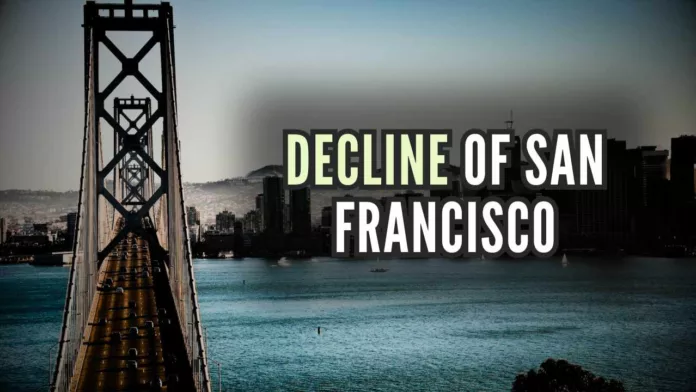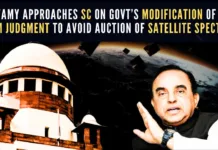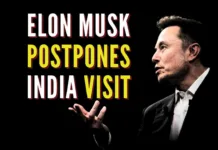
San Francisco faces a serious threat
The history of San Francisco is a rich and diverse tapestry that dates back a couple of centuries. From its humble beginnings as a Spanish colonial outpost to its rise as a major city during the California Gold Rush to the deadly 1906 earthquake and fire to various social and cultural movements to the technological innovation of Silicon Valley, the city of San Francisco has witnessed significant events and transformations, which have sculpted this city’s resilient nature. However, the same city which was once a symbol of innovation, cultural diversity, and economic potential is now facing a serious threat due to a multitude of challenges.
Today, it doesn’t take long for someone who is walking on the streets of SFO lined with chic cafes and tiny mom-and-pop stores to run into a band of homeless, drug addicts, and petty thieves. Why? Decades of extreme left-leaning political vote banks, shameless pandering to groups that always play the victim card, and divide and rule based on religious minority vote banks are some of the reasons for this. The Covid hysteria, BLM movements, and the city’s dangerous areas have given more leeway for the left to push their agenda. Let’s examine two of these challenges: The exodus of the social networking platform, Twitter (now X), and the legalization of not registering any theft below $900.
Firstly, let’s talk about the implications of the exodus of the famous social networking platform, Twitter. To understand the effects this has on SFO, we first need to understand why Twitter is planning on leaving San Francisco. When billionaire, Elon Musk made a power move by taking over Twitter with a staggering $44 billion deal, only after a dense legal battle, more than half of the 7500 Twitter employees were laid off, requiring the remainder of the workers to commute to the office again. In an interview aired on CNBC, Musk completely flipped the company’s strong liberal ‘work from home’ policy, saying that the whole idea of ‘working from home’ was “morally wrong”, and “bullshit”. He argued that it was unfair to people who didn’t have the opportunity to remotely work. Hearing this, many Twitter employees quit their jobs to escape the new work policies set by Musk. In addition to changing liberal work policies, Musk also hinted at relocating the company’s headquarters outside of the Bay Area. Why? According to Musk, Twitter was creating an extremely left-leaning bias on the platform. “I think Twitter needs to be much more even-handed. It currently has a strong left bias, because it’s based in San Francisco,” he said at the Future of the Car Conference. He made sure to clarify, “I don’t think people out there necessarily intend, or at least perhaps some of them don’t intend to have a left bias, just from their perspective it seems moderate, they’re just coming at it from an environment that is very far left. So, this fails to build trust in the rest of the United States and perhaps other parts of the world.” In addition to this, Musk also mentioned that he would allow former president Donald Trump back on Twitter. He believed that it was wrong to ban Donald Trump and that it “alienated a large part of our country”, and ultimately resulted in Trump not having a voice.
The mistake, Musk said, was implementing a permanent ban on Trump, which was put in place solely because of the decision made by Twitter’s ex-Chief Legal Officer, Vijaya Gadde, now fired by Musk, rather than a temporary suspension. He clarifies that “Permanent bans should be extremely rare and really reserved for accounts that are bots, or scam, spam accounts.”
San Francisco’s Chief economist, Ted Egan says that the whole idea of Twitter leaving its headquarters in SFO was bad news not only for those fired but the entire city itself. Putting aside the effects this had on the employees when a major company leaves its headquarters behind, it loses many potential investments. SFO’s extremely woke culture and left-leaning ideologies directly affected the company’s future.
Secondly, San Francisco passed a new law for police officers – thefts under $900 are legal. This approach seriously damages the trust that many people keep in law enforcement. By not registering “petty” crimes, we will directly create an environment where individuals are emboldened to commit petty crimes and escape without facing the consequences. This leads to a sense of disorder and an overall hatred towards law enforcement. Political commentator Ajit Datta says on Twitter, “San Francisco has decriminalized petty theft. Cops can’t stop or prosecute anyone who steals anything worth less than $900. So people have been picking things up at stores and walking (or cycling) out. First world.” Well, that’s a city in a first-world country for you. And the fact that the lawmakers consider any theft below $900 as “petty” is sickening. A theft of $900 is not “petty”. For many families, the $900 profit they could have earned, if it weren’t for the individuals stealing their goods, can help with rent, utilities, groceries, medical expenses, education funds, personal care items, transportation, debt relief, or even an emergency fund. Keep in mind that this is $900 per thief. So, on average if we consider around 10 family members savagely ransacking a store together, business owners can see a loss of around $9000. This possible profit is being snatched from small store owners forcing them to close their businesses to the public. A dearth of businesses in any city can lead to some serious economic impacts, limited services and amenities, population decline, and deterioration of infrastructure. All of these factors can contribute to the decline of San Francisco. Furthermore, this policy can have an adverse effect on small businesses, especially in the most economically vulnerable neighborhoods. The legalization of shoplifting and thefts under $900 can significantly hurt retailers who might already be grappling with high maintenance costs and fierce competition. This disheartening rule is causing many families who rely on their small stores for a living to close their businesses.
A crime is a crime. Theft or burglary should result in a maximum fine of $5000, or a 10-year sentence, depending on the severity of the offense. Leaving these people to do as they wish can have a huge toll on the income of a household.
San Francisco’s gradual decline into absolute disorder and mayhem is influenced by a complex interplay of various factors, two of the most influential being:
- Twitter leaving San Francisco.
- The legalization of theft under $900.
Unless the left-leaning policies and woke culture don’t tune it down, the city of San Francisco might not be too far away from its end.
Note:
1. Text in Blue points to additional data on the topic.
2. The views expressed here are those of the author and do not necessarily represent or reflect the views of PGurus.
For all the latest updates, download PGurus App.










